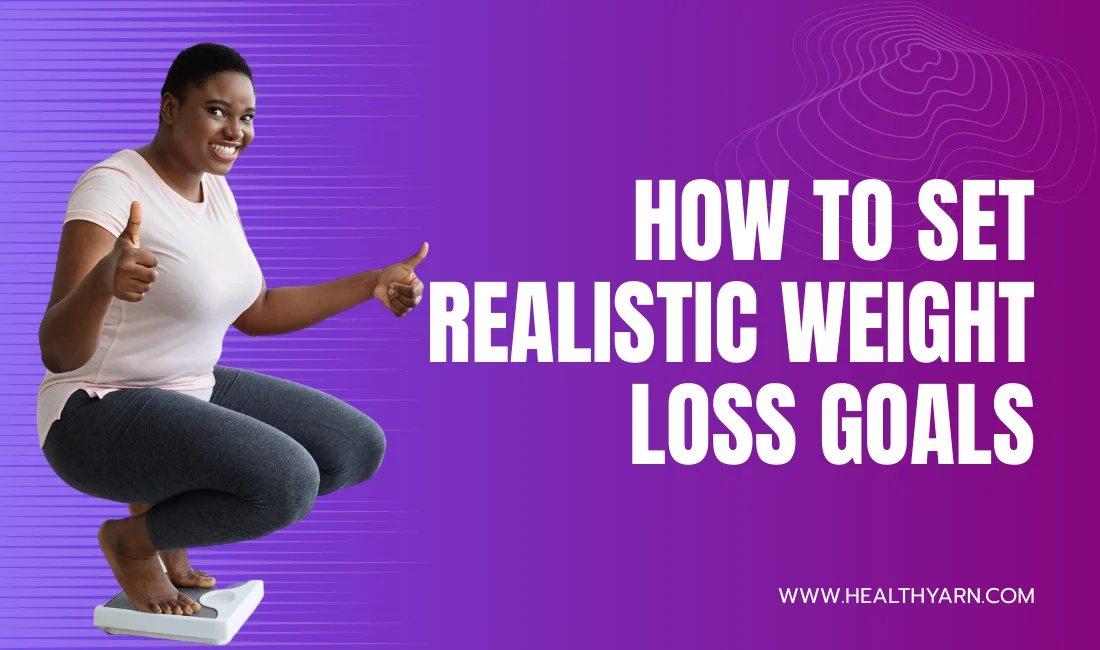Introduction To How to Set Realistic Weight Loss Goals
When it comes to embarking on a weight loss journey, one of the crucial factors for success is setting realistic goals. In this article, we will delve into the process of establishing achievable weight loss goals and the benefits that come with them. By understanding the significance of realistic goal setting, monitoring progress, overcoming challenges, and celebrating milestones, you can create a roadmap to a healthier you.
Definition of Weight Loss Goals
Weight loss goals refer to the desired outcomes you set for yourself in terms of shedding excess pounds and achieving a healthier body weight. These goals act as milestones that guide your progress and motivate you along the way.
Importance of Setting Realistic Goals
Setting realistic weight loss goals is vital for several reasons. Firstly, it ensures that your expectations align with what is achievable, preventing frustration and disappointment. Additionally, realistic goals provide a sense of direction, helping you stay focused and motivated throughout your weight loss journey.
Understanding Realistic Weight Loss
Understanding what it means to set realistic weight loss goals is crucial for your journey towards a healthier and happier you. Realistic goals provide a solid foundation for sustainable progress and help you avoid frustration and disappointment. We will explore the key elements of understanding realistic weight loss and how they can contribute to your success.
Before diving into the process of goal setting, it’s essential to consider various factors that influence the realistic nature of your objectives. Taking these factors into account will enable you to set weight loss goals that are not only achievable but also tailored to your unique circumstances.
- Health and Physical Condition: Your overall health and physical condition play a significant role in determining the realistic nature of your weight loss goals. Consider any underlying medical conditions you may have, such as cardiovascular issues, diabetes, or joint problems.
- Lifestyle and Commitments: Your lifestyle and daily commitments can impact the feasibility of your weight loss goals. Consider your work schedule, family responsibilities, and social commitments.
- Time Frame: The time frame in which you set your weight loss goals can greatly influence their realistic nature. It’s important to strike a balance between achieving results within a reasonable time frame and allowing yourself enough time to make sustainable changes.
- Support System: The presence of a strong support system can significantly impact the realistic nature of your weight loss goals. Having supportive friends, family members, or even joining a weight loss community or support group can provide encouragement, accountability, and motivation throughout your journey.
- Psychological Factors: The psychological aspect of goal setting should not be overlooked. It’s important to assess your mindset, emotional well-being, and any underlying psychological factors that may influence your weight loss goals.
Understanding the concept of realistic weight loss empowers you to set goals that are appropriate for your body, health, and circumstances. By considering the factors at play and finding the balance between ambition and achievability, you can embark on a weight loss journey that is both effective and sustainable.
Factors to Consider for Realistic Goal Setting
Several factors come into play when setting realistic weight loss goals. These include your current weight, body composition, age, gender, lifestyle, and overall health. Taking these factors into account allows you to establish goals that are specific to your circumstances and increase your chances of success.
- Current Weight: Your current weight serves as a starting point for your weight loss journey. It provides valuable information about your body’s composition and helps you determine a realistic goal. Consider how much weight you want to lose and what is a healthy range for your height and body type.
- Body Composition: Your body composition, including the proportion of muscle, fat, and water, influences how your weight loss progresses. It’s important to recognize that losing fat while preserving muscle mass is often the desired outcome. Setting goals that focus on body composition changes, such as reducing body fat percentage or increasing lean muscle mass, can be more meaningful than solely aiming for a certain number on the scale.
- Age and Gender: Age and gender can impact weight loss progress and the speed at which you may achieve your goals. Metabolism tends to slow down with age, making weight loss more challenging. Similarly, hormonal differences between genders can affect the rate at which fat is burned or muscle is built. Understanding these factors helps you set realistic expectations and adjust your approach accordingly.
- Lifestyle: Your lifestyle plays a significant role in determining realistic weight loss goals. Consider your daily routine, work commitments, family responsibilities, and social activities. It’s crucial to set goals that align with your lifestyle and allow you to make sustainable changes. For example, if you have a sedentary job, incorporating regular physical activity into your routine becomes even more essential.
- Overall Health: Your overall health should always be a priority when setting weight loss goals. Consider any pre-existing medical conditions, such as diabetes, high blood pressure, or joint problems, that may require special attention. Consulting with healthcare professionals, such as your doctor or a registered dietitian, ensures that your goals are in line with your health needs and that you embark on a safe weight loss journey.
By taking these factors into account, you can establish realistic weight loss goals that are specific to your circumstances. This personalized approach increases your chances of success and helps you create a sustainable plan that considers your current weight, body composition, age, gender, lifestyle, and overall health. Remember that the journey to a healthier weight is unique to each individual, and setting realistic goals sets you on the path to long-term success.
Impact of Current Weight and Body Composition
Your starting weight and body composition can significantly impact the speed and extent of your weight loss. Those with higher body fat percentages may experience faster initial weight loss due to a higher caloric expenditure. On the other hand, individuals with less body fat might observe slower progress as their bodies adapt to the changes.
Consideration of Individual Health Conditions
Individuals with specific health conditions, such as diabetes, heart disease, or thyroid disorders, should consult healthcare professionals when setting weight loss goals. These conditions may require tailored approaches to ensure safety and effectiveness.
Benefits of Setting Realistic Weight Loss Goals
Establishing realistic weight loss goals offers numerous benefits beyond the physical aspect of shedding pounds. Let’s explore some of these advantages.
Motivation and Psychological Well-being
Realistic goals provide a constant source of motivation throughout your weight loss journey. As you achieve smaller milestones along the way, it boosts your self-confidence and fosters a positive mindset. This psychological well-being plays a significant role in long-term success.
Increased Chances of Success
When goals are realistic, they become attainable targets that you can work towards with dedication and perseverance. By setting achievable objectives, you enhance your chances of reaching them, leading to a sense of accomplishment and further motivation.
Long-term Lifestyle Changes
Realistic weight loss goals focus not only on shedding pounds but also on adopting healthier habits and sustainable lifestyle changes. By incorporating realistic goals into your routine, you develop new behaviors that support long-term weight management.
Strategies for Setting Realistic Weight Loss Goals
Now that we understand the importance and benefits of setting realistic weight loss goals, let’s explore some strategies to help you establish effective objectives.
Introduction to the SMART Goal-setting Framework
The SMART (Specific, Measurable, Achievable, Relevant, and Time-bound) framework is an effective tool for goal setting. Applying this framework to your weight loss goals ensures clarity and increases your chances of success.
Tips for Specific, Measurable, Achievable, Relevant, and Time-bound Goals
- Specific: Clearly define what you want to achieve. For example, instead of setting a vague goal like “lose weight,” specify the amount of weight you aim to lose or the dress size you want to reach.
- Measurable: Set goals that can be quantified, allowing you to track your progress effectively. For instance, aim to lose a specific number of pounds or inches.
- Achievable: Ensure that your goals are within your reach. Consider your lifestyle, current habits, and resources when determining what is achievable for you.
- Relevant: Align your goals with your overall health and well-being objectives. It’s essential to prioritize goals that contribute to your long-term health and happiness.
- Time-bound: Set a deadline for achieving your goals. Having a timeline provides a sense of urgency and helps you stay on track.
Consulting Healthcare Professionals for Personalized Advice
While general guidelines can be helpful, it’s always beneficial to consult healthcare professionals when setting weight loss goals. They can provide personalized advice based on your individual needs, health conditions, and any potential challenges you may face.
Monitoring Progress and Adjusting Goals
Once you’ve set your realistic weight loss goals, it’s crucial to monitor your progress and make adjustments along the way.
Importance of Tracking Weight Loss Progress
Tracking your weight loss progress allows you to evaluate your efforts and make informed decisions. It provides valuable insights into what is working and what might require modification.
Methods for Monitoring Progress
Consider using the following methods to track your weight loss progress:
- Weigh-ins: Regularly weigh yourself to gauge your progress. Aim for consistent weigh-ins, such as once a week, at the same time of day, to obtain accurate readings.
- Body Measurements: Track your body measurements, including waist circumference, hip circumference, and body fat percentage, to observe changes beyond the numbers on the scale.
- Food and Exercise Journals: Keep a record of your daily food intake and physical activity to identify patterns, make adjustments, and stay accountable.
- Progress Photos: Take pictures at regular intervals to visually assess your transformation and keep you motivated.
Making Necessary Adjustments
Weight loss journeys are rarely linear, and adjustments may be necessary along the way. If you encounter plateaus or challenges, reassess your goals and strategies. Be flexible and open to modifying your approach to continue progressing towards your objectives.
Overcoming Challenges and Staying Motivated
Weight loss journeys often present various challenges that can hinder progress. However, with the right strategies, you can overcome these obstacles and maintain your motivation.
Common Challenges During Weight Loss Journeys
- Plateaus: Periods where weight loss slows down or halts altogether. Plateaus are normal and can be overcome with adjustments to your diet, exercise routine, or stress management strategies.
- Setbacks: Unexpected events or lapses in adherence to your weight loss plan. It’s crucial to view setbacks as temporary and get back on track rather than letting them derail your progress.
- Lack of Motivation: Loss of motivation can occur at different stages of your weight loss journey. Implement strategies like seeking support from friends and family, joining a community or support group, or engaging in activities that inspire and motivate you.
Strategies to Overcome Plateaus and Setbacks
- Evaluate and Modify: Assess your current habits, diet, and exercise routine to identify areas that need adjustment. Tweak your approach based on your findings.
- Focus on Non-scale Victories: Shift your focus from the numbers on the scale to other positive changes, such as increased energy levels, improved sleep, or enhanced mood.
- Reward Yourself: Celebrate your progress by rewarding yourself with non-food-related treats, such as a spa day, a new book, or a day off work. Rewards can help you stay motivated and acknowledge your efforts.
Maintaining Motivation and Self-discipline
Motivation and self-discipline are essential for staying on track with your weight loss goals.
- Visualize Success: Imagine how you will feel and look when you achieve your goals. Visualizing success can boost your motivation and provide a clear image of your desired outcome.
- Create a Supportive Environment: Surround yourself with people who support your goals and share similar aspirations. Engage in activities that promote a healthy lifestyle and align with your objectives.
- Practice Self-care: Take care of your physical and mental well-being by incorporating self-care activities into your routine. This can include meditation, journaling, engaging in hobbies, or seeking professional support if needed.
Celebrating Milestones and Non-Scale Victories
In addition to celebrating weight loss milestones, it’s essential to acknowledge and appreciate non-scale victories along your journey.
Acknowledging Progress Beyond Weight Loss Numbers
Weight loss is not solely defined by the numbers on the scale. Acknowledge other positive changes, such as increased strength, improved cardiovascular fitness, better sleep quality, enhanced mood, or boosted confidence.
Non-scale Victories and Their Significance
Non-scale victories refer to achievements that go beyond weight loss, such as fitting into old clothes, receiving compliments, participating in physical activities you previously couldn’t, or improving your overall health markers. Recognizing and celebrating these victories reinforces the positive changes you’ve made.
Conclusion
Setting realistic weight loss goals is a crucial step towards achieving long-term success. By understanding the importance of realistic goals, strategies for goal setting, monitoring progress, overcoming challenges, and celebrating milestones, you can create a sustainable and effective weight loss plan. Remember to be patient, kind to yourself, and embrace the journey towards a healthier and happier you.









